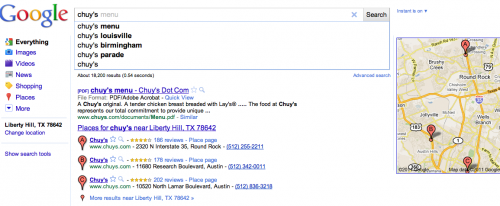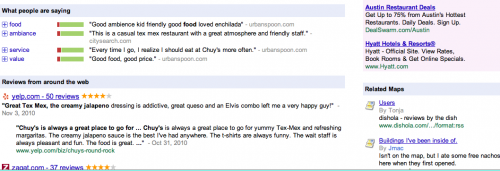Review Sites’ Rancor Rises With Prominence of Google Place Pages
Friends or enemies? Partners or competitors? Google’s relationship with review sites like TripAdvisor and Yelp is as complicated as ever, and the disputes are likely to increase as the search giant pursues mobile and local ambitions that center around its controversial Place pages. The rancor stems from the way Google aggregates content from various review […]
Friends or enemies? Partners or competitors? Google’s relationship with review sites like TripAdvisor and Yelp is as complicated as ever, and the disputes are likely to increase as the search giant pursues mobile and local ambitions that center around its controversial Place pages.
The rancor stems from the way Google aggregates content from various review sites onto its Place pages, showing snippets of reviews posted by users of other sites. While Google undoubtedly drives traffic to the review sites, the aggregation tacitly encourages users to think there’s no need to go anywhere else. Critics also argue that Google is puts its own Places results higher than links to review sites in organic search results, even if the review sites have better content.

Google's Place Pages in Organic Search Results
Possibly the most outspoken critic of Google’s Places policy is travel review site TripAdvisor, which says Google recently informed it that will no longer limit content featured on Google Places, but will instead feature it “as they so choose,” according to TripAdvisor founder and CEO Steve Kaufer. TripAdvsor’s complaints include that Google picks out one review to display more prominently. “It’s not a good way to represent the opinions of all of our users,” says Kaufer, “and severely takes away from travelers’ ability to make informed decisions.”
TripAdvisor has gone so far as to accuse Google of abusing its dominance in search through unfair business practices, and Kaufer has been writing an ongoing series of blog posts answering questions about the issue.
Restaurant and bar reviews site Yelp has similar gripes to TripAdvisor. “We have the majority of the content [in the category],” said Stephanie Ichinose, a Yelp spokesperson. “Is this the best way for consumers to find Yelp content?”

Yelp Reviews on a Google Place Page
The issue isn’t limited to Places pages. In Products, too, Google can raise the ire of review sites, that say the search giant is simply giving too much away. “When they are seeing all that [on Google],” said ResellerRatings.com CEO Scott Wainner, “they don’t need to go to our site.”
Google says it won’t comment specifically on any situation but says its main goal is to help users find the local information they’re seeking. “Each day we send millions of customer referrals to local businesses and third party websites, such as review sites, through local search,” a Google spokesperson told me. “The overwhelming feedback we get from users, business owners and website owners is that they value the answers and traffic they receive from local search.”
What review sites should do about their unhappiness is a complex question. Legal action, a technical block or “noindex” metatag are options, but fairly drastic ones.
“Google has also advised that if we want to stop content from appearing on Google Places we would have to reduce/stop Google’s ability to scan the TripAdvisor site,” said Kaufer “Needless to say, this would have a significant impact on TripAdvisor’s ranking on natural search queries through Google and, as such, we are not blocking Google from scanning our site.”
TripAdvisor, Yelp and ResellerRatings all say they’re in active discussions with Google, and TripAdvisor has asked Google to not index them, “until Google Places begins showing TripAdvisor’s traveler reviews and information the right way,” said Kaufer.
Yelp wouldn’t divulge its next move. “I think it’s safe to say we continue to work toward an experience that makes both of us happy,” said Ichinose.
ResellerRatings has basically changed its business model after measuring the impact of Google. Previously, the company had been trying to license its content, but now it’s focused on charging the reviewed companies for tools to manage their online reputations. “We had to adapt and change,” said Wainner.
Related stories
New on Search Engine Land